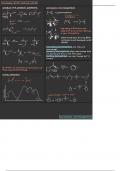Carbocation rearrangement - Study guides, Class notes & Summaries
Looking for the best study guides, study notes and summaries about Carbocation rearrangement? On this page you'll find 29 study documents about Carbocation rearrangement.
Page 3 out of 29 results
Sort by
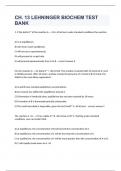
-
Test Bank for Lehninger Principles of Biochemistry 7th Edition by Nelson (complete, questions/answers/rationales)
- Exam (elaborations) • 9 pages • 2023
- Available in package deal
-
- $14.99
- + learn more
1. If the delta G'° of the reaction A --> B is -40 kJ/mol, under standard conditions the reaction: A) is at equilibrium. B) will never reach equilibrium. C) will not occur spontaneously. D) will proceed at a rapid rate. E) will proceed spontaneously from A to B. E For the reaction A --->B, delta G'° = -60 kJ/mol. The reaction is started with 10 mmol of A; no B is initially present. After 24 hours, analysis reveals the presence of 2 mmol of B, 8 mmol of A. Which is the mo...
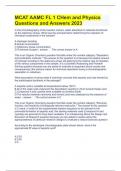
-
MCAT AAMC FL 1 CHem and Physics Questions and Answers 2023
- Exam (elaborations) • 20 pages • 2023
- Available in package deal
-
- $24.49
- + learn more
MCAT AAMC FL 1 CHem and Physics Questions and Answers 2023 In the chromatography of the reaction mixture, water absorbed on cellulose functioned as the stationary phase. What was the principal factor determining the migration of individual components in the sample? A.Hydrogen bonding B.Solute concentration C.Stationary phase concentration D.Thickness of paper The correct answer is A. This is an Organic Chemistry question that falls under the content category "Separation and purificat...
3/23/2023 lecture notes, lecture 2 with Matt Bowman, Introductory Organic Chemistry I Spring Semester 2023
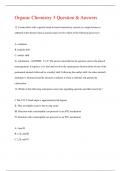
-
Organic Chemistry 3 Question & Answers
- Exam (elaborations) • 27 pages • 2024
-
- $11.49
- + learn more
Organic Chemistry 3 Question & Answers 13. Certain diols with a specific bond-to-bond connectivity convert to a single ketone or aldehyde when heated. Such a reaction must involve which of the following processes? A. oxidation B. hydride shift C. methyl shift D. substitution - ANSWER: 13) C; The process described in the question stem is the pinacol rearrangement. It requires a vic-diol and involves the spontaneous disassociation of one of the protonated alcohols followed by a methyl shif...
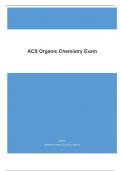
-
ACS Organic Chemistry Exam
- Exam (elaborations) • 8 pages • 2024
-
- $12.49
- + learn more
What is the general formula for a carbohydrate? - Correct Answers: Cx(H2O)y How do you determine the number of stereoisomers for a given carbohydrate? - Correct Answers: 2^n where n= number of stereocenters Distinguish between the D and L designations for carbohydrates. - Correct Answers: In the L form the hydroxy group is on the bottom left closest to the CH2OH group in the frame of a Fischer projection In the D form the OH is on the bottom right What are anomers? - Correct Answe...
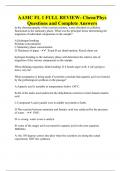
-
AAMC FL 1 FULL REVIEW- Chem/Phys Questions and Complete Answers
- Exam (elaborations) • 20 pages • 2023
-
- $12.29
- + learn more
In the chromatography of the reaction mixture, water absorbed on cellulose functioned as the stationary phase. What was the principal factor determining the migration of individual components in the sample? A.Hydrogen bonding B.Solute concentration C.Stationary phase concentration D.Thickness of paper - B and D are dumb options. Knock them out. hydrogen bonding to the stationary phase will determine the relative rate of migration of the various components in the sample. When thin...
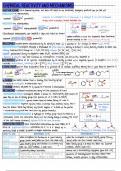
-
Chemical reactivity and mechanisms
- Class notes • 2 pages • 2024
- Available in package deal
-
- $7.99
- + learn more
explains how chemical mechanisms work and shows diagrams with mechanism arrows drawn. Explains and diagrams 4 key mechanisms and defines key terms needed to understand mechanisms.
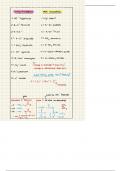
-
Organic Chemistry 1 All Reaction Summary
- Other • 10 pages • 2023
-
- $7.99
- + learn more
This is a ten-page document that covers all reactions necessary for the Organic Chemistry 1 final exam. It covers topics such as SN1/Sn2 (Nucleophilic Substitution), and Elimination reactions (E1/E2), as well as alkene and alkyne reactions with reagent and substrate examples. Provides tables for solvents and mechanisms with details on stereochemistry and rearrangements.
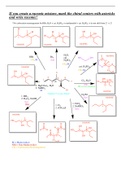
-
Alkene Reactions Summary
- Class notes • 1 pages • 2023
- Available in package deal
-
- $4.49
- + learn more
The summary sheet over different alkene reactions including racemic products, Markovnikov, and Carbocation Rearrangement involved.

How did he do that? By selling his study resources on Stuvia. Try it yourself! Discover all about earning on Stuvia

